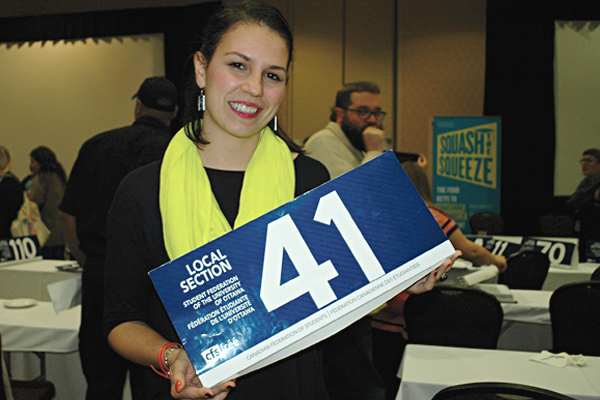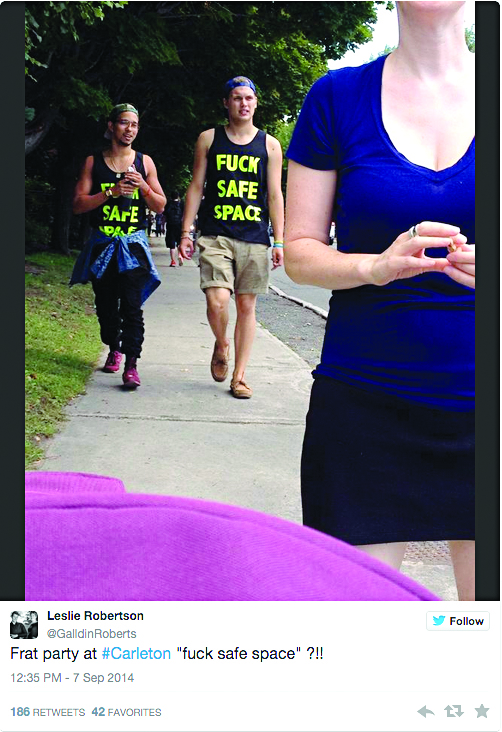Walji talks about his vision for the Board of Governors
The University of Ottawa and the University of Ottawa Students’ Union (UOSU) are currently holding elections for the Board of Governors. This article will shed light on the candidates participating in the race.
The BOG is responsible for the university’s overall management and governance; it is in charge of finances, policies, and procedures. Two undergraduate students sit on the BOG, they are elected to two-year terms.
In June 2020, Saada Hussen was elected to her second term on the BOG where she will serve till 2022. The current BOG election will determine who joins her on the board; the elected candidate will serve until 2023.
The University of Ottawa’s Adam Walji participated in a question and answer with the Fulcrum to discuss his platform. For those who wish to get familiar with Walji, the following is a transcription of the interview. All answers have been edited for length and clarity.
The Fulcrum (F) : Who is Adam Walji and why are you running for the BOG?
Adam Walji (AW): I’m in my fourth year right now in the [Bachelor of Commerce/Juris Doctor]. I have two more years to go. I have a lot of experience with working with the youth — with students and with regards to mental health, emotional health, and youth development in general. And some of my interests are reading, Netflix and cooking.
F: Can you talk about previous involvements in student life on campus and any other experiences that you think would help you for this role?
AW: I think the biggest one that comes into play is my role as a Senator on the University Senate. Not the last term, but the term before, I was elected to the Senate to be the faculty of law’s student senator. That role involved a lot of interactions with the administration, with deans from various faculties, with various other students senators. While I mentioned last year that I would have liked to see more interaction between student leadership, there was that aspect of communicating with the student body itself and representing the interests of the student body in the Senate.
I was also the University of Ottawa’s Kamadia Saheb, this isn’t specific to the U of O, but all students in Ottawa. So, Algonquin, the University of Ottawa, Carleton. And in that role, on the one had, there’s the spiritual side of things, running the congregation. But on the other side, there is … the development and the resilience of mental health, physical health, emotional health of the students in the community. In that role, it engaged a lot of personal situations with students, helping them through various challenges, and really understanding the challenges that students face on their own.
Another role that I held before that position was outside the university, I was a member for positivity development, on the Youth and Sports Board … we’re really looking at the challenges that students face. And it’s not just within the community, within their religious identity, but what they experience outside of that as well.
F: What would be your role on the Board of Governors? What would your duty be to students?
AW: I think, contrary to what the University likes to tell its candidates, with regards to what the role of the student rep on the BOG or the student Senate is, I really think it’s about more than just bringing a student voice to the table. I think it’s about representing the student body as a whole.
What that requires is, first of all, gaining an understanding of the student voice, and that requires communication and constant collaboration with the student body itself, whether that’s leadership on the board or leadership from various student organizations. But I personally disagree with the university’s notion that the responsibility of the student board is to just offer a student’s perspective. In my opinion, the student rep[resentative] on the BOG should be really pushing that student voice, and really understanding the student perspective with regards to various issues on campus and really fighting for the needs of the students, things that have to do with mental health, tuition, racism, or any other issue that faces students today. The students on the board are the only insight that the board has about what the student community is feeling, what they are experiencing, because the members of the board are, for the most part, external.
F: How do you plan on communicating on what happens at the Board of Governors meetings to those who elected you?
AW: This is one priority that I’ve had since last year, has been the establishment of that student leadership committee. The student body is not aware of everything, within the different levels of student leadership, there’s needs to be some consistency in communication. The priority that I have is to form a committee with student leadership from the Senate, from the BOG, from the various faculty student associations. And I was really glad to hear Tim [Gulliver] speaking earlier on about the student caucus that he has with the UOSU. That is new. And I remember discussing this with him when my term was ending as a Senator. And so, I’m glad that happened.
I think the first step in informing the student body is informing the student leadership. Just to make sure everyone knows what’s going on, at all levels of the BOG and Senate. From there, you open up the avenue to communication with the students. Because, it’s not just two members of the board trying to communicate to 40,000 students. [Instead] you have representation from each faculty who can also spread the information to the various faculties. Which will help to reach more students. And I’m hoping that one of the things that comes out of it, is a lot more engagement from students.
F: F: International student fees are at an all-time high, how do you plan on advocating for them?
AW: The fees that our international students pay are ridiculous … International student fees are not just higher, they’re a little too extreme. The focus on lower tuition in the past has focused on the impact on students. Negative impact financially, negative impact on their mental health, or another reason. But each time, [they] have been rejected.
So, I’m thinking of a different approach, with regards to how we can accomplish a tuition reduction. Let’s look at taking a certain amount of tuition, or reducing the tuition of these students by a certain amount, and see how much money we lose, and then find a way to get that money somewhere else so that the university doesn’t consider that as a loss of revenue in its essence. In the sense that they’re not losing the tuition revenue, but they’re making it up somewhere else. From my perspective, this sort of plan leaves the BOG with no reason to say no. Before, yes, the issues that were brought forward by other student reps, those reasons should have been enough to lead to a reduction, they weren’t, and from my understanding, it’s mainly because tuition makes up the majority of the revenue. So this plan that I have, and I’m happy to go into it a little bit, is essentially to make-up for that loss so there’s no reason to say no. Especially for international students and the fees that they have — a tuition reduction can go a long way.
F: How do you plan on working to improve mental health and wellness on campus?
AW: The thing to note with regards to mental health on our campus is that, as we’ve seen in the past, we’ve been pushing the investment in mental health recommendations … It takes time and it takes a lot of pressure. In the short term, there has to be a solution. And so, obviously the work that Saada [Hussen] and Jaime [Ghossein] have done with regard to mental health has been nothing short of exceptional, but I think there’s still a long way to go. So I think working with the BOG to implement the recommendations is going to take a lot of lobbying, advocacy, and it’s going to take time. That’s the reality of the situation. It shouldn’t take time, when students are struggling, but it will.
So, in the short-term, while we’re working toward those implementations and those long-term changes, we should focus on supporting students. People have long fought for investment in mental health, for increases in counsellors and what not. Some of it has been granted, but a lot of it has not. So, the perspective that I’m taking in this platform is, students helping students. That means creating support groups specifically facilitated and run by students. Student groups where students can go to and talk with people who understand what they’re going through…
F: For next fall, Jill Scott has said that she plans to have 30 to 50 per cent of courses in person. How are you going to work with the BOG to develop a plan that is both fair and safe for students coming back to campus?
AW: I was very much surprised at the university’s announcement, mainly due to the timing of it, COVID-19 continues to be unpredictable. I feel like it was a risk to the mental health of the students to announce that they’re hoping to have 30 to 50 per cent of students on campus. And the reason I say it, is that anything can happen in the next two months. Yes, we have a plan, yes we have vaccines, but anything can happen. And if for some reason things do not allow for those 30 to 50 per cent capacity and student attendance, that could have a detrimental impact to the mental health of the students … When it comes to [a return], we’re going to have to evaluate many factors, one being international students and their time zones, whether vaccination plays a role in considering who would come back.I’ve heard different options, I’ve heard professors discussing maybe having students come into class for a week and stay home for a week so that another group of students can come in. But it will really fall to respecting the guidelines set by the government.
With regards to formulating a plan, that’s where it really comes into play, and the BOG, the Senate, and especially UOSU, should be working together to form this plan. Because the Senate handles the academic policy, the BOG handles the governing side, and UOSU has the student experience and perspective that might be missing from the two boards. When it comes to working with the administration to come-up with a plan, I think it’s going to take more than the board and the senate. I think the administration is going to have to open up a bit as to what they’re looking at. And working towards that. And then you know, keeping their perspectives open to the perspectives of UOSU and the student representatives — to create a plan that is conformed to the health guidelines but still holds the best interest of the students. We want all students back on campus, I think all of us are ready to come back. But we don’t want to jeopardize the safety of the students in a way that would lead to another closure. So those are the considerations that we have to keep in mind.
F: How do you plan on actively fighting racism on campus and keeping your fellow governors to account?
AW: This issue frustrates me to my core. We’re in 2021, like this shouldn’t be happening. Tim [Gulliver] mentioned this as well, no one should have to deal with this today. And yet, we’re going through this situation, not just in, you know Canadian society, not just in the States, not just outside of the university where things are happening. University is a place of growth, where people work together to build themselves for the future. Not this nonsense, discrimination and racism. Today, we’re seeing anti-asian hate, anti-Black hate, Indigenous hate, and it’s just frustrating.
With regards to creating a safe space on campus, I think since day one, my campaign even last year has been focused on creating a warm, welcoming, and safe environment. And I think what that will involve is primarily investing in some sort of mandatory training program. I think that’s going to take more than just the BOG, and the reason I say that is because If you look on my campaign page, you’ll note that there is a section where we will try to propose and adopt a motion for mandatory racial sensitivity training for all employees. The lacking aspect there is, what about everyone else? This is where the Senate is going to have to get involved, and UOSU as well — it’s going to have to be a collaborative effort, it can’t come from one place. The Senate sets academic requirements, all of the academic policy goes to the Senate. And so, mandating racial sensitivity training, and … It’s frustrating to talk about [racism on campus] because [it] shouldn’t be happening, but this sort of sensitivity training [should be] mandatory for employees and a program requirement for students. I think that’s the first big step towards that safe and open space. I think the next part that we really need to work on … is open dialogue. I am aware that before COVID-19 hit, that there were some in-person open-discussions with the administration. But then what? Nothing has happened. But the reality is, working with the board is going to be a big step in getting that investment and to create the inviting structure on our campus by imposing that mandatory training. And I think there’s going to have to be some sort of policy or program that punishes the individuals who demonstrate these anti-race, anti-religion behaviours. That is one side of it. And the other side is eliminating unconscious bias.
F: At the end of your mandate, what is the one thing you would like students to remember you for?
AW: I’d like to be remembered as one student governor who increased student engagement and accessibility to the governance of the university. What I mean by that is really opening myself up to the student community. I want the student community to bring up issues, not only to me, but student leadership in general. I saw Tim [Gulliver’s] response with regards to passion. That’s a great answer. I think I’ll go a different route — I’d like to be the one who is remembered as being the start of the accessibility and engagement of students in the governance of our university. Whether that’s through the comfort of discussing with student leadership, whether it’s not feeling nervous or shamed for the challenges that you go through and seeking out leadership to find a solution.
F: Why should students vote for you?
AW:I do believe that the notion of change is an opportunity for growth. I also believe that with COVID-19 even though it’s been a year, there are still constant changes that are happening. This is the time to push for change. Why should people vote for me? I’ll give you three reasons. Relationships, experience, and a plan.
I have relationships with various levels of the university which I think could be very advantageous to the administration of the university, with the president and other members of the administration, deans from various faculties that I developed while I was in the Senate. So, I think this will be an effective tool that will allow student voices to be heard more efficiently.
The second reason I mentioned is experience. Experience with the work that I did as a Senator, really pushing for that student voice. But also understanding the issues that students face today and various other roles, mental health, we discussed racism, we discussed tuition. These issues have allowed me to develop a global understanding of what we need.
And the plan, a real plan, I think, the other candidates are running excellent, excellent campaigns. And in the past years, many of the candidates have run excellent campaigns. They identified key issues that students are facing and continue to face/have faced for years. The problem that has stuck out the most is the actual ‘how’ we are going to solve those issues. With regards to tuition, I have a plan, a sponsorship plan that could bring money into the university to make-up for the loss. When we talk about racism, there is a plan to implement this mandatory sensitivity training among other things. And of course, the biggest one in my opinion is bringing back that student community together. I think that the big first step to really push for this change is this united front of student leadership. There are over 37,000 students on campus. From the BOGs perspective, the money is coming-in from and for the students. So, you have to make the accommodations for the students and really focus on their campus experience, in my opinion. There are plans ready to go if I’m elected. And even if I’m not elected, I’ve met with other candidates and we’ve discussed options to bring forth the best possibility for students.
I firmly believe that we have the opportunity for growth. We are in a time where there are constant changes with a lot of negativities, in general. So in addition to that, there are three reasons, relations, experiences, and a plan to make those changes happen.





